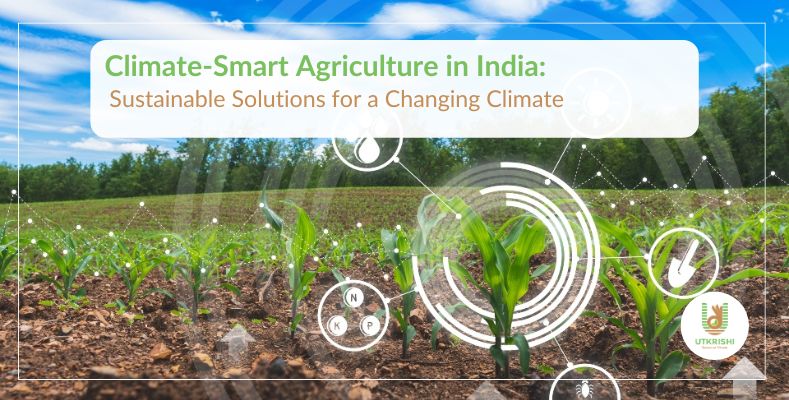Climate-smart agriculture in India is becoming a critical response to the country’s evolving environmental challenges. As India’s farming sector grapples with the impact of climate change, farmers are turning to sustainable agricultural practices that not only enhance productivity but also build resilience against climate-induced stress.
In this blog, we’ll explore the concept of climate-smart farming, its importance in India, and key initiatives aimed at driving sustainable agriculture across the country.
Unable to load the shape
What is Climate-Smart Agriculture?
Climate-smart agriculture (CSA) refers to farming practices that aim to increase agricultural productivity, enhance resilience to climate variability, and reduce greenhouse gas emissions. The goal of CSA is to create more resilient food systems while addressing the impacts of climate change.
For India, where agriculture is a key contributor to both employment and GDP, adopting climate-resilient farming methods is crucial for ensuring food security and sustaining rural livelihoods.
Unable to load the shape
Challenges of Indian Agriculture in the Face of Climate Change
Indian agriculture faces numerous challenges exacerbated by climate change. Some key challenges include:
- Unpredictable Weather Patterns: Irregular rainfall, droughts, and extreme weather events have become more frequent, impacting crop yields.
- Depleting Water Resources: Over-reliance on groundwater for irrigation is unsustainable, and many regions face acute water shortages.
- Small and Marginal Farmers: More than 85% of Indian farmers are smallholders, making it difficult for them to adopt new technologies without government support.
- Rising Temperatures: Higher temperatures negatively affect staple crops like wheat, rice, and maize, reducing productivity.
Unable to load the shape
Climate-Smart Solutions for Indian Farmers
To address these challenges, India is embracing several climate-smart agriculture techniques:
- Conservation Agriculture: Practices like no-till farming, crop rotation, and leaving crop residues on the field improve soil health and help in moisture retention, making crops more drought-resistant.
- Water-Efficient Irrigation: Micro-irrigation techniques such as drip irrigation and sprinkler systems optimize water use, especially in water-scarce regions.
- Drought-Resistant Crop Varieties: Scientists are developing and promoting drought-tolerant seeds to ensure productivity even during dry spells.
- Agroforestry: Combining trees with crops and livestock improves biodiversity and enhances ecosystem services, including carbon sequestration.
- Renewable Energy in Farming: Solar-powered irrigation pumps and biogas from agricultural waste are being promoted to reduce the carbon footprint of farming activities.
Unable to load the shape
Key Initiatives Promoting Climate-Smart Agriculture in India
India has launched several government schemes and projects to promote sustainable agriculture and climate-smart farming. Some notable initiatives include:
1. National Mission for Sustainable Agriculture (NMSA)
As part of the National Action Plan on Climate Change, NMSA promotes sustainable farming practices such as water management, soil health improvement, and climate-resilient cropping patterns.
2. Pradhan Mantri Krishi Sinchayee Yojana (PMKSY)
This scheme focuses on improving water-use efficiency through micro-irrigation technologies like drip and sprinkler irrigation, ensuring that every drop of water is used effectively.
3. Soil Health Card Scheme
Launched to promote soil health management, this scheme provides farmers with detailed soil fertility reports, helping them apply fertilizers more judiciously, which also helps in reducing agricultural emissions.
4. Zero Budget Natural Farming (ZBNF)
ZBNF encourages low-cost farming by utilizing locally available natural resources. This helps farmers reduce their dependency on chemical inputs while enhancing soil fertility.
5. Kisan Urja Suraksha evam Utthaan Mahabhiyan (KUSUM)
Under this initiative, farmers are provided financial support to install solar pumps for irrigation, promoting the use of renewable energy in agriculture.
Unable to load the shape
The Role of Technology in Climate-Smart Agriculture
Technology plays a key role in scaling up climate-smart agriculture in India. From precision farming to AI-driven solutions, Indian farmers now have access to tools that provide real-time data on weather patterns, soil health, and crop management.
One such platform is Utkrishi, developed by Eldew Digital. Utkrishi leverages artificial intelligence and predictive analytics to offer farmers actionable insights, enabling them to make informed decisions about irrigation, fertilization, and crop protection.
Unable to load the shape
Success Stories of Climate-Smart Agriculture in India
Across India, several regions have witnessed success with CSA:
- Andhra Pradesh: The Andhra Pradesh Drought Mitigation Project has helped over 1,00,000 farmers adopt climate-resilient cropping patterns and improve soil health.
- Madhya Pradesh: The Climate-Smart Village Program has led to enhanced water-use efficiency and better soil health management, reducing the vulnerability of farmers to erratic weather.
Why Climate-Smart Agriculture is the Future of Indian Farming
The future of agriculture in India is deeply intertwined with climate-smart solutions. With climate change increasingly affecting crop yields and threatening food security, adopting climate-smart farming practices is crucial. Government initiatives, technological innovation, and farmer-led efforts will play a pivotal role in transforming Indian agriculture into a more resilient and sustainable sector.
As India continues its journey towards climate-resilient agriculture, there’s a growing realization that sustainable practices are not only necessary for food security but also for protecting the environment.
Conclusion
Climate-smart agriculture is an essential strategy for India’s agricultural future. By integrating traditional farming wisdom with modern technology, India is paving the way for a resilient agricultural system. Whether through water conservation, crop diversification, or renewable energy, climate-smart farming is not just a necessity—it’s the key to sustainable growth in an ever-changing world.


